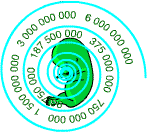The Sacred Act of Statistics: A Decennial Reflection
Created | Updated Aug 1, 2010

I have just done a really patriotic thing. I am still glowing with the pride of it. Okay, okay, if you don't do it, federal marshals could theoretically come and get you, and you'd probably be haunted forever by the Spirit of '76 – or in my case, my Revolutionary War ancestors, who didn't haul all those supplies over to Valley Forge for nothing – but hey, let me bask a little. After all, I have performed what the official form itself refers to as a "burden". Right there, in black and white, right before it tells you that you are allowed to complain to the Paperwork Reduction Project. Best of all for a patriotic duty, it only took the statutory ten minutes. (All right, Elektra helped me with the hard words.)
I have just filled out the 2010 Census Report. Stop laughing. This "burden", this duty, is enshrined in the US Ever-Lovin' Constitution. Knee-britcheted Founders with lots on their mind back in 1787 took quill pens in hand and decreed, mind you, that every ten years, this country would be counted – to the last man, woman, and child. So counted it shall be, in saecula saeculorum1, Amen.
I tuned into the government's website (just to make sure I wasn't violating any Official Secrets Act by sharing this information with The Enemy) and found a thrilling video in which a highly-placed bureaucrat points proudly to a James Madison-generated ink stain on the wooden floor, and asserts without blushing that this ink was spilled during the writing of the Virginia Plan2. So I am replete with history.
I know what else I am replete with, thank you, so stop sniggering in the back row. It isn't becoming.
Part of the reason for this obsessive and, one might think, premature fascination with demographic data was the almighty fight they had to get the Constitution written in the first place. You see, the old Articles of Confederation didn't work at all – just try running a government when you can't collect taxes3, see where that gets you – and something had to be done before they tore the place down. (We'd just won a war against the mightiest power in the known universe4, and now we were free but broke, partly due to printing cardboard money5.) Now even the diehards – all except that blowhard Pat "Give-Me-Liberty" Henry – were ready to admit we needed a document with some muscle in it6. Especially poor old George Washington, who was sick and tired of waiting for somebody to show up to work in Congress and pass a law or two.
But as they laboured on the sub-, infra-, and superstructure of the planet's first experiment at proving John Locke right, they got into a lot of arguments. It was hot in Philadelphia – so what else was new? – and having the windows nailed shut for security didn't exactly help tempers.
The main problem was representation: the big states thought they ought to count heads and be proportional (of course), while the little states like Rhode Island thought they ought to get the same vote (of course). Finally, somebody smart from Connecticut came up with the brilliant idea of the bicameral legislature, and bob's-yer-uncle, they could get out of the heat.
As long as they could count.
So in 1790, they did. They counted everybody in the place, from cobblestoned town to rough wilderness. It took the marshals eighteen months and a lot of persuading of suspicious farmers. They came up with a number: 3,929,214. Of those, almost exactly half were 16 and under. Wow. Young country – or a dangerous one.
Since then, rain or shine, they've been counting people every ten years, regular as clockwork. This is even more remarkable when you consider that the first census to use an adding machine – it's what they had before computers, my dear – was in 1890. Americans were astounded when it only took six months to count everybody up. But then they refused to believe the number, anyway.
The data are so sacred, so sacrosanct, that:
- The census takers, even though they are part-time workers earning a lousy salary, have to take an oath to protect confidentiality, and
- Even the FBI can't get in there.
This year's census is the shortest ever – only ten questions. Basically, who are you, when were you born, how old are you (just to make sure you can count, I guess), do you live here all the time, are you Hispanic?, and what race are you? (Being Hispanic is a Big Deal, and is broken down by country). Also, how many people are in the house, is it a house, apartment, or mobile home (I guess a tent would be mobile), and what's your phone number in case we don't understand an answer? I am disappointed. I thought they'd ask me something else. Oh, well. Whew. Done, done, and done. Mail it, and get a chuckle out of the original envelope's "Your Response Is Required by Law".
Okay, okay, you don't have to come and get me, Feds. Just as my great-great-great-grandfather did, back when Tennessee was a frontier (I've seen the facsimile pages online), I answered my census questions. I even remembered to "use blue or black ink".
The spreadsheet-spangled banner – long may she wave.

Fact and Fiction by Dmitri Gheorgheni Archive
